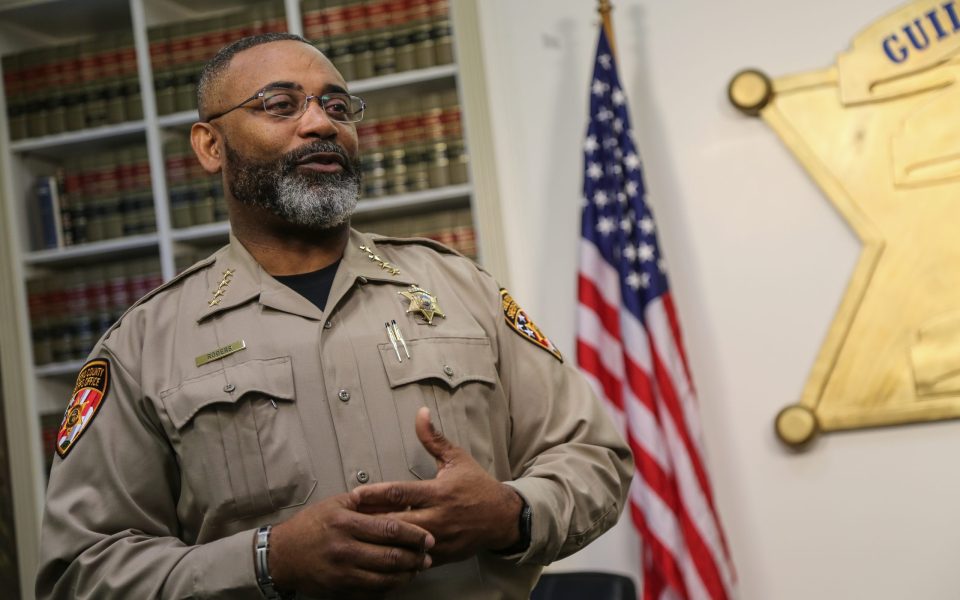For years, the Guilford County Sheriff’s Office was the
Triad’s lone holdout among law enforcement agencies in refusing to sign on to
the FaithAction ID program, even as police departments in Greensboro,
Winston-Salem and Burlington and the Forsyth County Sheriff’s Office did so.
Former Sheriff BJ Barnes even hosted a 2015 bill signing by former Gov. Pat McCrory to enact legislation that purported to ban the use of the alternative ID as a means for undocumented people to verify their identity to law enforcement. But the ID provision of the bill amounted to little more than get-tough posturing, considering that Republican leaders agreed to a request by the NC Association of Police Chiefs and NC Sheriffs’ Association to come back later and carve out an exemption for law enforcement through a legislative mechanism known as a “technical corrections bill.”
The Guilford County Sheriff’s Office now becomes the latest
law enforcement agency in North Carolina to sign a memorandum of agreement with
FaithAction International, a Greensboro-based nonprofit. Sheriff Danny Rogers,
a Democrat who defeated Barnes in the 2018 election, signed the agreement on
July 3. While more cautious than other black Democrat sheriffs elected in urban
counties on promises to protect immigrants, Rogers has also implemented a policy
requiring judicial warrants before handing over detainees to Immigration
Customs Enforcement, or ICE, and withdrew support for HB 370, a bill that would
require sheriffs to honor detainers, which are requests to hold inmates without
a judicial warrant.
Under the agreement signed by Sheriff Rogers on July 3, the
agency agrees to use the FaithAction ID car “to assist [sheriff’s office] personnel,
in their discretion, to determine the identity or residency of a person who has
no other documents available at that time which provide an indication of
identity or residency of the individual.”
For an undocumented person who needs to drive to work,
school, shopping, medical appointments and other day-to-day living requirements
but isn’t legally allowed to obtain a driver’s license, the FaithAction ID can
make the difference between being issued a traffic citation and going to jail,
the latter of which can potentially set in motion a chain of events ending in
deportation.
Assistant Sheriff’s Attorney Tom Carruthers said that,
consistent with how other law enforcement agencies use the program and also with
state law, patrol deputies will hold discretion on whether to accept the
FaithAction ID and will still be allowed to make an arrest if they determine
the ID is not valid for some reason. The IDs could also be used by family
members visiting loved ones in jail.
Some members of command staff met with FaithAction
International Executive Director David Fraccaro for a training on July 11,
Carruthers said, adding that a follow-up meeting is being scheduled.
Carruthers said he is currently working on modifications to
the visitation policy at the jail so that they reflect the memorandum of
agreement with FaithAction. He said the agreement to recognize the ID will be
communicated to patrol deputies and detention officers at a later date.
“We’ve had good interactions with folks at the sheriff’s
office,” Fraccaro told Triad City Beat. “The vast majority of people we’ve interacted
with who work at the jail, on the streets or behind the scenes understand the
importance of the program. We’re taking the steps that we need to, to make sure
there’s a solid partnership in place, and have had good conversations about
what that looks like.”
Fraccaro said over
the past six years, FaithAction International has obtained written or verbal
agreements with 24 law enforcement agencies across North Carolina. An ID drive
is scheduled for Saturday in Boone, one of five new partnerships in the
mountains. Beyond North Carolina, FaithAction has also enlisted law enforcement
agencies to recognize the ID in Cincinnati, Ohio; Gainesville and West Palm
Beach, Fla.; Ames, Iowa; Charlottesville, Va.; Hood River, Ore.; and Aiken, SC.
“Of 200 surveyed who’ve
had their ID for one year, 95 percent say the card has been very useful with
law enforcement, schools, health centers and businesses, and that the card has
helped them feel safer and more a part of the community,” Fraccaro said.
Fraccaro said he
recognizes that the alternative ID is not a panacea for the challenges
undocumented people face in the current political climate of polarization and
crackdown. In April, FaithAction helped author legislation introduced by Rep.
Pricey Harrison (D-Guilford), Rep. Susan Fisher (D-Buncombe), Rep. Graig Meyer
(D-Wake) and Rep. Marcia Morey (D-Durham) to authorize the Division of Motor
Vehicles to issue driver’s licenses to immigrants with limited or no status.
The Democrat-sponsored bill was denied a hearing by the Republican leadership
in the House.
“We understand as it
relates to the immigrant community, that the larger goal would be a North
Carolina driver’s license or immigration reform that creates a pathway to
citizenship,” Fraccaro said, “but this program has been beneficial.”
Join the First Amendment Society, a membership that goes directly to funding TCB‘s newsroom.
We believe that reporting can save the world.
The TCB First Amendment Society recognizes the vital role of a free, unfettered press with a bundling of local experiences designed to build community, and unique engagements with our newsroom that will help you understand, and shape, local journalism’s critical role in uplifting the people in our cities.
All revenue goes directly into the newsroom as reporters’ salaries and freelance commissions.


Leave a Reply